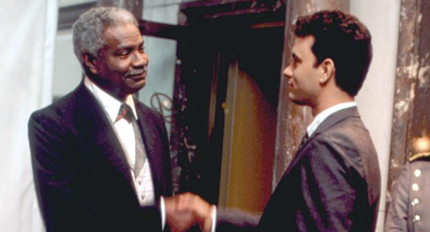It’s a little sad to me that he and Ruby Dee start out separated by someone on my alphabetical file of all these articles on my computer. They were married in 1948 and in the end were only separated by death. They discussed having an open marriage in the ‘60s, as was the fashion at the time, but Davis apparently didn’t want to go after all the young women he’d initially considered when agreeing to it. He wanted to be with Dee—and he didn’t want anyone else to. Not everyone finds it as heartwarming as I do, but I’ve also always half-suspected that she didn’t want an open relationship and went along with it to appease him, knowing how it would end.
He was actually born Raiford Chatman Davis, and it’s believed a clerk misheard his mother saying “R.C.” His father, meanwhile, was a railway construction engineer who was threatened by the KKK for having a job too advanced for a black man. Clearly, the children responded, “Hold my beer.” Three of them have Wikipedia pages. (The remaining two were a pharmacist and a biology teacher.) His sister Essie earned a Masters in social work and was the first black woman to head a regional branch of the VA. His brother William invented instant mashed potatoes. (Wikipedia also claims he was a knife-juggler, but since the link to the source goes to a typing test, I’m inclined to doubt?) And then there was Ossie.
Davis started his career in 1939, which you may note is not a year when a young black actor was going to get a lot of good roles. His Wikipedia page says he “followed the example of Sidney Poitier,” but he was ten years older and started his career when Poitier was twelve. It is, however, true that both men avoided playing the kinds of stereotyped roles most frequently available to black men in those days—and depressingly often these as well. He tried to avoid playing servant roles; when he did, he played them as humans, because after all servants and Pullman porters are humans as well.
In addition to acting, Davis wrote and directed. His play Purlie Victorious also featured a young man by the name of Alan Alda. As a writer, he was able to create more complicated and nuanced black characters. As a director, he was able to get a wider array of characters in the movies. My generation may mostly know him as kindly older men who sometimes stray into a certain trope, but even my generation should remember him in Do the Right Thing if nothing else, where he once again got to act opposite Ruby.
But let us also not forget his work with the Civil Rights Movement. He was so involved that Malcolm X’s children called him “Uncle Ossie.” Yes, Alan Alda and Burt Reynolds spoke at his funeral, but so did Attallah Shabazz and Bill Clinton. Harry Belafonte, who like him straddled the border between acting and activism. And in fact, Clinton said he thought Davis would make a good President. Certainly he couldn’t do worse than the other US Presidents with a history in entertainment.
Support independent writers by contributing to my Patreon or Ko-fi!

